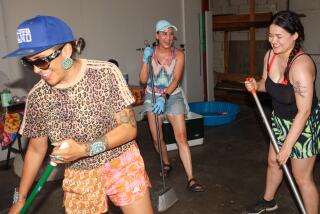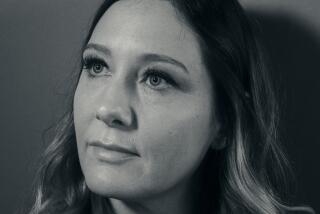Healthy Outlook
- Share via
She has survived two kidney transplants, a two-year battle with lymphoma, a car accident and a chronic muscular disorder. Still, Wilma Mankiller, the only woman to serve as chief of the Cherokee Nation, feels lucky.
“Other people would look at all this and say, ‘This is really awful,’ ” said Mankiller, who led the Native American tribe from 1985 to 1995. “But that’s not the way I look at my life. Certainly, my health has always been an issue. I’ve continued to work and tried to find some lessons in all of that.”
Mankiller will address the lessons she has learned when she appears as the keynote speaker Saturday at Creative Options, a day of women-oriented workshops at Cal Lutheran University.
Now 53, Mankiller has published an autobiography, won the Presidential Medal of Freedom and raised two daughters.
“I’m going to actually talk about leadership basically by taking people through my own story,” she said in a phone interview from her Oklahoma home. “I think that journey is important to share.”
The journey began in 1945 when Mankiller was born in rural Adair County, Okla. When she was 10, her family moved to San Francisco as part of the Bureau of Indian Affairs Relocation Program.
Mankiller first became involved with American Indian issues when a group of Native American activists occupied Alcatraz Island in San Francisco in 1969.
At that time, Mankiller was married and raising two daughters but continued to do volunteer work for Native American organizations. Soon, her life as the wife of a successful accountant from Ecuador no longer fit with her life as an activist. Mankiller divorced her husband and returned to her home in Oklahoma.
She began working for the Cherokee tribe as a grant writer and then started the tribe’s community development department. She believes Native Americans should be self-sufficient and encouraged to work out their own problems. As part of that effort, she started the tribe’s first elderly program, a child-nutrition program, a nursery and a garden business.
By 1979, Mankiller had finished her bachelor’s degree and began commuting to the University of Arkansas to work toward her master’s. A head-on collision while en route to school killed her best friend and left Mankiller in a wheelchair for nearly a year. That triggered the development of myasthenia gravis, a disease characterized by extreme muscle fatigue and weakness.
“Without my earlier illnesses, I don’t think I could have been an effective leader of the Cherokee Nation,” Mankiller said.
In 1983, she was elected the tribe’s deputy chief and took over as chief in 1985. Twice reelected, Mankiller was a popular leader. During her tenure, tribal membership tripled and the annual budget doubled. Unfortunately, health was again an issue and in 1990 Mankiller had to have a kidney transplant.
After a few years of relative good health, Mankiller again began to feel ill. She decided not to run for reelection in 1995 and later learned she had lymphoma. The cancer caused her body to reject the transplanted kidney and she had to have a second transplant.
In the meantime, she managed to co-write “Mankiller: A Chief and Her People,” about her life and the history of the Cherokee Nation. She has edited another book and is working on three others. The new projects focus on the lessons that Cherokee culture has to teach--lessons that have had the most influence on Mankiller.
Today, Mankiller lives with her second husband, Charlie Soap, an administrator at the Boys & Girls Club of Tahlequah, Okla. The couple live on land her family acquired in a settlement with the federal government. Her daughters are grown and have their own children.
“One thing that I learned from watching Cherokee people was no matter what would go on in their lives . . . they always found something positive to say,” Mankiller said.
It was Mankiller’s ability to tease out the good and brush aside the bad that piqued the interest of Creative Option planners.
“We’ve wanted to have Wilma for a long time,” said Kateri Alexander, co-chairwoman for A Day for Women. “She represents so much of what women are today. Thoughtful. Strong. Free thinking.”
Cal Lutheran started Creative Options 20 years ago, working with the Thousand Oaks chapter of the American Assn. of University Women. The idea was to present a day for women to address issues of importance to them, Alexander said.
The daylong event kicks off with the keynote address and includes workshops. Seminar topics include “Women’s Investment Strategies,” “Managing Anger Differently,” “Wildflowers of the Conejo” and “Sex after 40.”
“It’s a day to learn something new and also to be thoughtful. We don’t have our children, husbands or office,” Alexander said. “It’s a time to play and be ourselves, without all the trappings of our daily lives.”
FYI
“Creative Options, A Day For Women” will be at Cal Lutheran University from 8 a.m. to 4 p.m. Saturday. Tickets are $30 general; $20 for seniors, $10 for students. 60 W. Olsen Road, Thousand Oaks. For more information, call 493-3345.
More to Read
Sign up for Essential California
The most important California stories and recommendations in your inbox every morning.
You may occasionally receive promotional content from the Los Angeles Times.













